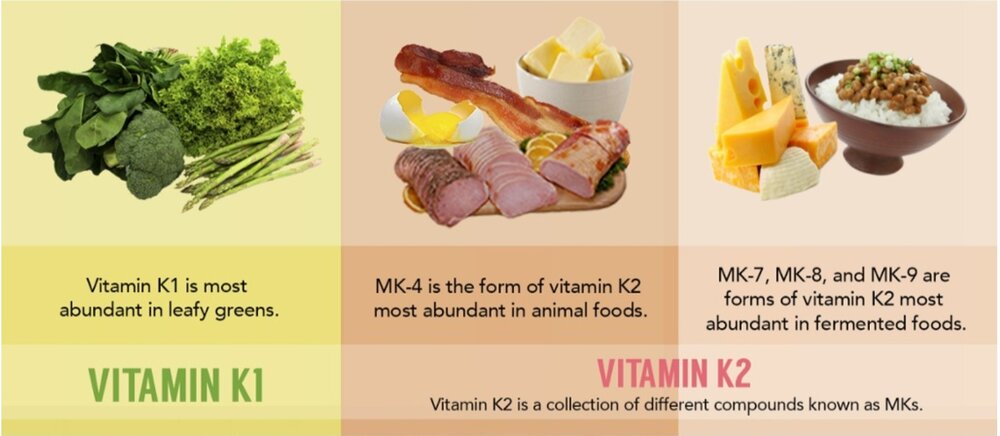How do vitamins K1 and K2 work?
Vitamin K activates proteins that play a role in blood clotting, calcium metabolism, and heart health.
One of its most important functions is to regulate calcium deposition. In other words, it promotes the calcification of bones and prevents the calcification of blood vessels and kidneys (3Trusted Source).
Some scientists have suggested that the roles of vitamins K1 and K2 are quite different, and many feel that they should be classified as separate nutrients altogether.
In controlled studies in people, researchers have also observed that vitamin K2 supplements generally improve bone and heart health, while vitamin K1 has no significant benefits (4Trusted Source).
However, more human studies are needed before the functional differences between vitamins K1 and K2 can be fully understood.
However, more human studies are needed before the functional differences between vitamins K1 and K2 can be fully understood.
- May help prevent heart disease
- May help improve bone health and lower your risk of osteoporosis
- May improve dental health
- May help fight cancer
20 Foods That Are High in Vitamin K
- Kale (cooked) — 443% of the DV per serving
- Mustard greens (cooked) — 346% of the DV per serving
- Swiss chard (raw) — 332% of the DV per serving
- Collard greens (cooked) — 322% of the DV per serving
- Natto — 261% of the DV per serving
- Spinach (raw) — 121% of the DV per serving
- Broccoli (cooked) — 92% of the DV per serving
- Brussels sprouts (cooked) — 91% of the DV per serving
- Beef liver — 60% of the DV per serving
- Pork chops — 49% of the DV per serving
- Chicken — 43% of the DV per serving
- Goose liver paste — 40% of the DV per serving
- Green beans (cooked) — 25% of the DV per serving
- Prunes — 24% of the DV per serving
- Kiwi — 23% of the DV per serving
- Soybean oil — 21% of the DV per serving
- Hard cheeses — 20% of the DV per serving
- Avocado — 18% of the DV per serving
- Green peas (cooked) — 17% of the DV per serving
- Soft cheeses — 14% of the DV per serving
3 more vegetables high in vitamin K
- Beet greens (cooked) — 290% of the DV per serving
- Parsley (fresh) — 137% of the DV per serving
- Cabbage (cooked) — 68% of the DV per serving
6 more meat products high in vitamin K
- Bacon — 25% of the DV per serving
- Ground beef — 7% of the DV per serving
- Pork liver — 6% of the DV per serving
- Duck breast — 4% of the DV per serving
- Beef kidneys — 4% of the DV per serving
- Chicken liver — 3% of the DV per serving
9 more dairy foods and eggs high in vitamin K
- Jarlsberg cheese — 19% of the DV per serving
- Soft cheeses — 14% of the DV per serving
- Edam cheese — 11% of the DV per serving
- Blue cheese — 9% of the DV per serving
- Egg yolk — 5% of the DV per serving
- Cheddar — 3% of the DV per serving
- Whole milk — 3% of the DV per serving
- Butter — 2% of the DV per serving
- Cream — 2% of the DV per serving
7 more fruits high in vitamin K
- Blackberries — 12% of the DV per serving
- Blueberries — 12% of the DV per serving
- Pomegranate — 12% of the DV per serving
- Figs (dried) — 6% of the DV per serving
- Tomatoes (sun-dried) — 4% of the DV per serving
- Grapes — 3% of the DV per serving
- Red currants — 3% of the DV per serving
8 more nuts and legumes high in vitamin K
- Soybeans (cooked) — 13% of the DV per serving
- Sprouted mung beans (cooked) — 12% of the DV per serving
- Cashews — 8% of the DV per serving
- Red kidney beans (cooked) — 6% of the DV per serving
- Hazelnuts — 3% of the DV per serving
- Pine nuts — 1% of the DV per serving
- Pecans — 1% of the DV per serving
- Walnuts — 1% of the DV per serving
Sufficient amounts of vitamin K2 may help inhibit calcification. Vitamin K2 helps keep calcium out of the arteries and in the bones, making the bones strong. Your
good bacteria make vitamin K2.
- Causes of a vitamin K2 deficiency:
- A fatty liver
- Gallbladder issues
- Gut problems
- Not consuming enough fermented foods
- A low-fat diet
![]()










